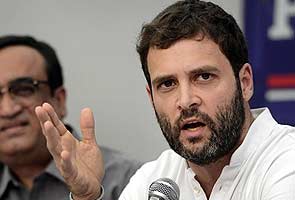 New Delhi, Sep 28: Rahul Gandhi jolted the UPA government and left Prime Minister Manmohan Singh out on a limb on Friday by trashing a controversial ordinance designed to protect convicted lawmakers from disqualification.
New Delhi, Sep 28: Rahul Gandhi jolted the UPA government and left Prime Minister Manmohan Singh out on a limb on Friday by trashing a controversial ordinance designed to protect convicted lawmakers from disqualification.
"My opinion of the ordinance is that it is complete nonsense and should be torn up and thrown away," the normally reticent Congress vice-president said of a piece of legislation steered by the PM and widely thought to have the backing of top Congress leaders.
Rahul's condemnation of the ordinance, which now looks dead in the water, exposed divisions between ruling party and government and undermined the position of PM Singh at the worst possible time -- two days before talks with Pakistan PM Nawaz Sharif and hours before a meeting with Barack Obama in New York.
The 43-year-old Gandhi scion strode into a media interaction by chief party spokesperson Ajay Maken at the Press Club of India and proceeded to demolish the controversial legislation before stunned partymen and journalists.
"What the government has done is wrong,", he said, adding that it was high time that political parties stopped taking decisions based on political considerations. The ordinance overturns a Supreme Court ruling mandating disqualification of convicted lawmakers facing at least a two-year jail sentence.
The Congress was trying to push it through despite a bill pending in Parliament, possibly to protect party Rajya Sabha MP Rasheed Masood and ally Lalu Prasad. But President Pranab Mukherjee, who has to sign the ordinance, is understood to have demurred, and sought clarifications. Who stands to lose?
Calls for the PM's head grew, with many observers seeing his position as untenable in light of Rahul's outburst and the likely stillbirth of the ordinance. But he appeared determined to soldier on, saying in New York that he would take up the matter on his return. But the government looked set to withdraw the ordinance.
Later, a letter Rahul wrote to the PM was made available to the media, which said, “I realize that what I feel about the ordinance is not in harmony with the cabinet decision and the core group’s view… You know I have the highest respect for you… I hope you will understand the strength of my own conviction about this very controversial issue.”
Leader of the opposition in the Rajya Sabha, the BJP's Arun Jaitley, was scathing in his criticism. "This is the highly belated realisation of what constitutes nonsense.....well the government makes mistakes, rest of the world makes mistakes, but the first family of the Congress doesn't make mistakes," he said.
Congress politicians, who had either been silent about their opposition to the ordinance or actively justified it to the media, quickly fell in line with Rahul, who many see as a possible successor to the PM if the UPA were to return to power in 2014.
"Today was the most appropriate day. He chose to speak at the decisive moment before the President was to take a decision," said a senior party leader.
Party leaders declined to confirm whether the issue of bringing an ordinance was discussed by the top Congress leadership during its core committee meeting last week.
Maken, who had started the interaction by explaining the need for the ordinance, said when asked whether it would be withdrawn: "Rahul ji's opinion is the opinion and the line of Congress... Now Congress party is opposed to this ordinance. The views of Congress party should always be supreme."
Some Congress leaders including Digvijaya Singh, Milind Deora and Sandeep Dikshit had expressed their reservations against the move.





Comments
Add new comment